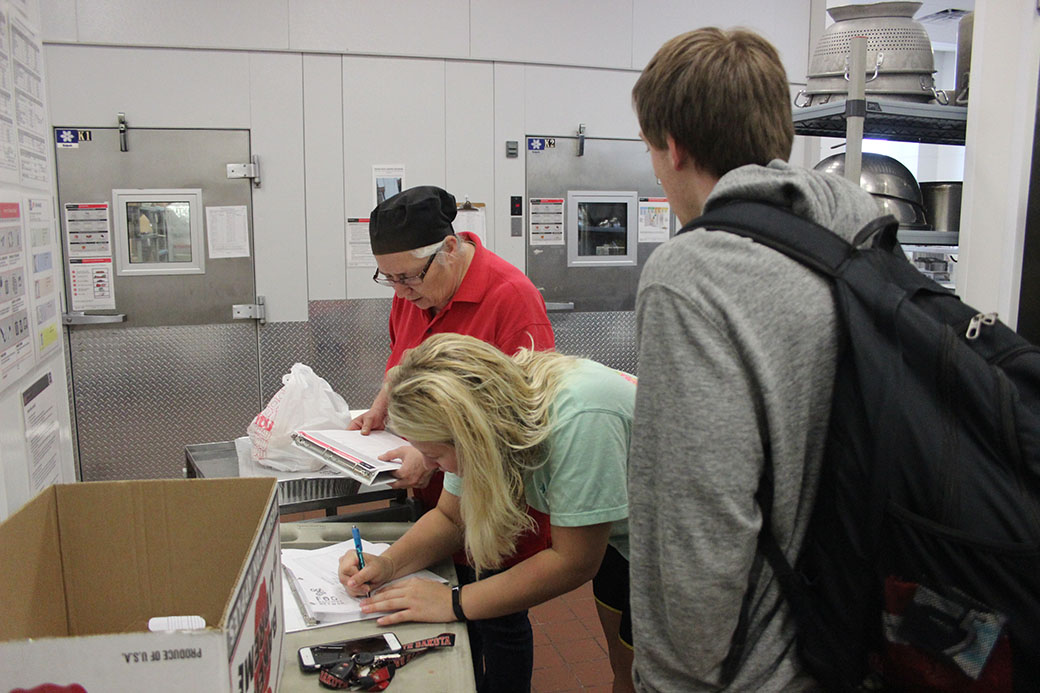
New program aims to help solve food insecurity with donated MUC food
The small, 15-pound box of assorted food being donated to the Vermillion Welcome Table on Friday wasn’t much of a sight to see, but for a few USD students, it was the culmination of more than a year of work.
A newly implemented Food Recovery Program at USD aims to take food that would otherwise be thrown out at the MUC and donate it to help solve food insecurity in Clay County.
“It’s a common sense solution to the problem. We’ve got food that’s not being used so let’s give it to people that need it. It’s an easy thing to do and something that we’re happy to do,” said Andrew Koch, the president of Alternative Week of Off-Campus
Learning (AWOL).
The program is part of the larger Food Recovery Network, a student movement which seeks to end food insecurity in the United States with more than 191 chapters at schools across the nation donating food to people in need via local nonprofit organizations.
The groundwork for USD’s chapter was laid by Eric Schlimgen, a recently graduated law student who was also working on his master’s degree in public administration. For his capstone project in public administration, he decided to tackle food insecurity, Koch said.
“As part of his capstone he wanted the Food Recovery Network thing to happen here because Vermillion does really struggle with food insecurity and food waste so the Food Recovery Network is a way to really combat both of those things at the same time,” he said.
Schlimgen, now a law clerk for the Fourth Judicial Circuit in Deadwood, South Dakota, said he’s happy that the program is being implemented and hopes it lasts for years to come.
“…This program will hopefully carry on long after I’m gone and long after the people who are collecting the food have graduated,”
he said.
According to Feeding South Dakota, a nonprofit organization that seeks to end hunger in South Dakota, more than 12 percent of South Dakota’s population has been food insecure in recent years.
And yet, across the U.S., nearly 100 billion pounds of food go to waste each year, according to
the organization.
“I know like even (Einstein Bros. Bagels) their bagels expire every four hours so if you can imagine how many people like during like a slow day or something — that’s a lot of bagels,” said Hailey Purves, an AWOL member and the director of the Food Recovery Network at USD who took over the project when Schlimgen graduated in the spring.
Thanks to the new program at USD, leftover food from the MUC will be frozen and packaged each week. On Fridays, student volunteers from AWOL, Students Enhancing Resources for Vermillion Enrichment (SERVE) and other organizations will pick up the food, weigh it, record what’s being donated and then drive it a few blocks from campus to the Welcome Table located at the First United
Methodist Church.
“As far as the Welcome Table is concerned, this is just going to make it more affordable for groups to be able to serve the Welcome Table because we’ll have food that they otherwise might have had to have catered or something,” said John Lushbough, the director of the local nonprofit organization where various volunteer groups serve food for at-need individuals
every week.
Lushbough said USD isn’t the only place that’s donating food on a weekly basis. Walmart and Hy-Vee also donate their leftover food to be used.
“I think we’ve really seen a huge difference in Vermillion just in the last couple of years with the amount food that’s been recovered, not just with this program — it’s just a sort of continuation of things,” he said.
Purves said students at USD should care about the food insecurity issue in the community and do what they can to help solve it.
“I knew when I was a freshman I wasn’t eating as many of my meals as I should have so they’re preparing meals for me to be eating but I’m not eating them. So why wouldn’t I, as a person who cares about other people and poverty and all of that kind of stuff, why wouldn’t I want other people to be able to enjoy the food that I just wasted?”
Purves said.
For the first day of the program only Purves and John Fanta, the president of SERVE, were the ones to collect the food, but Purves said they hope the number of students who take part in the program will grow as more people become aware about it.
Fanta said overall, he thinks the program is really needed in Vermillion and was glad the food donated Friday will be put to
good use.
“I think it’s a really needed program, especially just thinking about bringing the food over here and then thinking that food would have gone to waste you know or been thrown out,” he said. “It was like 10 pounds or 15 pounds of food so I think even though it might be small now it can make a difference, it will make a difference and will continue to make a difference if we keep working with the program.”

